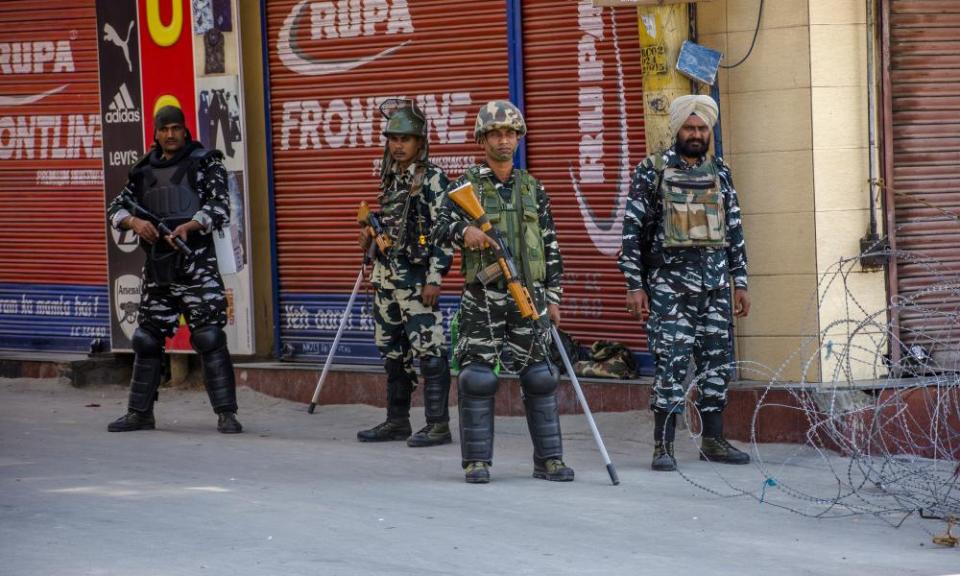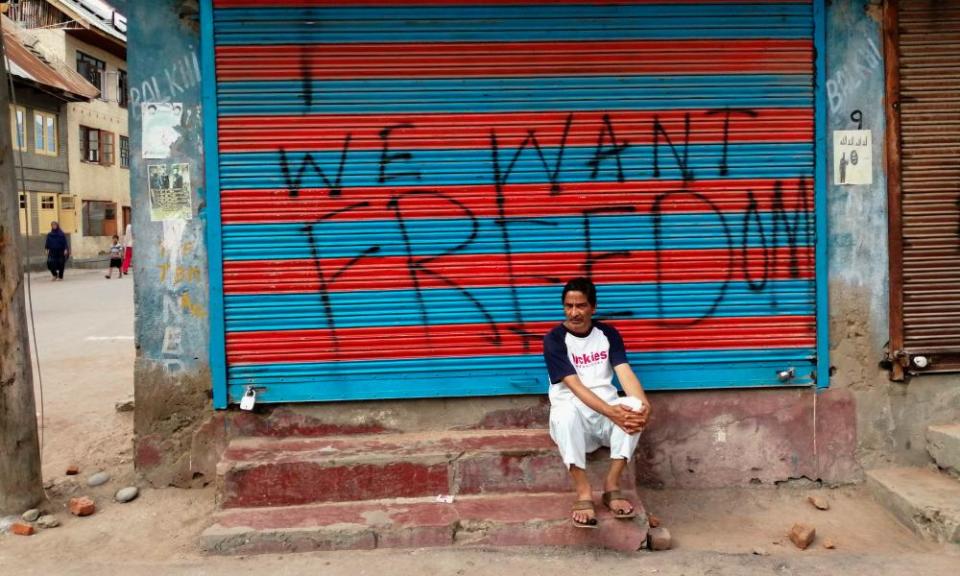Kashmir city on lockdown after calls for protest march

The main city in Indian-administered Kashmir has been placed under lockdown following calls for residents to march en masse against the revocation of the territory’s special status.
Posters were put up overnight this week urging people to defy a ban on public gatherings and join a march in Srinagar after Friday prayers. It is the first such call to be made by separatist leaders since Delhi stripped the region of autonomy almost three weeks ago.
The roads leading to the office of the UN Military Observer group, where protesters were instructed to march, were sealed off on Friday morning, with rolls of concertina wire and armoured vehicles stationed in the middle of the road.
Who controls Kashmir?
The region in the foothills of the Himalayas has been under dispute since India and Pakistan came into being in 1947.
Both claim it in full, but each controls a section of the territory, separated by one of the world's most heavily militarised borders: the ‘line of control’ based on a ceasefire border established after a 1947-48 war. China controls another part in the east.
India and Pakistan have gone to war a further two times over Kashmir, most recently in 1999. Artillery, mortar and small arms fire are still frequently exchanged.
How did the dispute start?
After the partition of colonial India in 1947, small, semi-autonomous ‘princely states’ across the subcontinent were being folded into India or Pakistan. The ruler of Kashmir dithered over which to join until tribal fighters entered from Pakistan intent on taking the region for Islamabad.
Kashmir asked Delhi for assistance, signing a treaty of accession in exchange for the intervention of Indian troops, who fought the Pakistanis to the modern-day line of control.
In 1948, the UN security council called for a referendum in Kashmir to determine which country the region would join or whether it would become an independent state. The referendum has never been held.
In its 1950 constitution, India granted Kashmir a large measure of independence. But since then it has eroded some of that autonomy and repeatedly intervened to rig elections and dismiss and jail democratically elected leaders.
What is Kashmir’s special status?
Kashmir’s special status, given in exchange for joining the Indian union, has been in place since 14 May 1954. Under article 370, the state was given a separate constitution, a flag, and autonomy over all matters except for foreign affairs and defence.
An additional provision, article 35a, prevented people from outside the state buying land in the territory. Many Kashmiris believed this was crucial to protecting the demography of the Muslim-majority state and its way of life.
The ruling Bharatiya Janata party repeatedly promised to scrap such rules, a long-term demand of its Hindu nationalist support base. But analysts warned doing so would almost certainly ignite unrest.
On Monday 5 August 2019, the government issued a presidential order to abolish Kashmir’s special status. The government argued that the provision was only intended to be temporary and that scrapping it would boost investment in Kashmir. Critics, however, said the move would escalate tensions with Pakistan – which quickly called India’s actions illegal – and fuel resentment in Kashmir, where there is an insurgency against Indian rule.
What do the militants want?
There has been an armed insurgency against Indian rule over its section of Kashmir for the past three decades. Indian soldiers and Pakistan-backed guerrillas fought a war rife with accusations of torture, forced disappearances and extra-judicial killing.
Until 2004, the militancy was made up largely of Pakistani and Afghan fighters. Since then, especially after protests were quashed with extreme force in 2016, locals have made up a growing share of the anti-India fighters.
For Indians, control of Kashmir – part of the country’s only Muslim-majority state – has been proof of its commitment to religious pluralism. For Pakistan, a state founded as a homeland for south Asian Muslims, it is the last occupied home of its co-religionists.
Michael Safi and Rebecca Ratcliffe
The office, located in Srinagar’s Sonwar neighbourhood, was set up in 1949 after the first war between India and Pakistan over Kashmir. The territory is claimed by India and Pakistan in full and ruled in part by both.
At a nearby roadblock, an elderly woman pleaded with the Indian paramilitary personnel to let her pass to go to a hospital. “I am an old woman. What harm will I do?” she asked in Kashmiri, a language many Indian paramilitaries do not understand.
An Indian paramilitary officer manning a roadblock told the Guardian his colleagues were under strict orders to keep the area isolated. “You know which office is there. We have been ordered not to allow anyone, not even the policemen,” he said.

It is understood that residents will be allowed to walk to local neighbourhood mosques, but a Muslim shrine near the UN office was closed to prayergoers. The roads leading in and out of Srinagar’s volatile old city, where protests are frequent and violent, were also blocked with concertina wire.
In the past, protests have frequently taken place after Friday prayers. Two weeks ago at least 10,000 people reportedly took to the streets after restrictions were eased to allow residents to attend mosques. BBC footage showed security forces firing and using teargas to disperse crowds.
Despite heavy security, sporadic protests have continued over the past two weeks. At least 152 people have been hurt by teargas and pellets, according to data collected by Reuters from the region’s two main hospitals.
The government, which has not yet provided any figures of the injured in the sporadic protests, has said there have been no deaths in this month’s demonstrations.

Millions of people in Kashmir have spent almost three weeks under a communications blackout with no access to phone or internet services. Landlines were restored in many areas last weekend, but mobile services remain suspended. Though travel restrictions were eased earlier this week, markets and shops across Kashmir valley remained shut.
A sympathiser of a banned political group, who asked not to be named, told the Guardian this week that the region was a “burning volcano”. “It will erupt any time,” he said.
One poster distributed in Srinagar this week urged “every person, young and old, men and women” to march on Friday, according to Reuters, which said the call was made by the Joint Resistance Leadership, which represents all major separatist groups.
Most separatist leaders are understood to have been detained. Thousands of other people – including lawyers, businessmen and mainstream politicians – have also reportedly been arrested by security forces.

The revocation of Kashmir’s special status is expected to face major resistance in the region. The move strips it of any autonomy, removing its constitution and rules that have prevented outsiders from buying land. Many Kashmiris fear that the change will alter the demography and traditions of the territory, India’s only Muslim-majority state.
Delhi’s actions have also escalated tensions with Pakistan, which claims Kashmir and has suggested India could carry out ethnic cleansing.
The US president, Donald Trump, who has repeatedly offered to mediate the matter, will raise the issue with the Indian prime minister, Narendra Modi, this weekend when they meet on the sidelines of the G7 meeting in France, according to a senior US administration official.
Trump will press Modi on how he plans to calm regional tensions after the withdrawal of Kashmir’s autonomy, and stress the need for dialogue, the official said.
Pakistan has long sought to internationalise the Kashmir dispute, but India has always rejected third party mediation and maintains that its recent actions in Kashmir are an internal matter.

 Yahoo News
Yahoo News 
